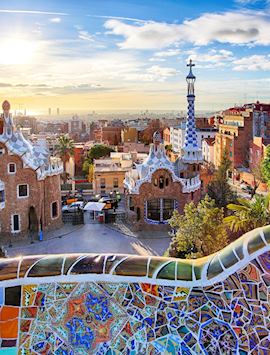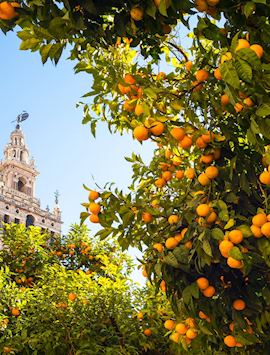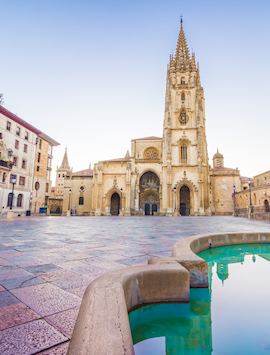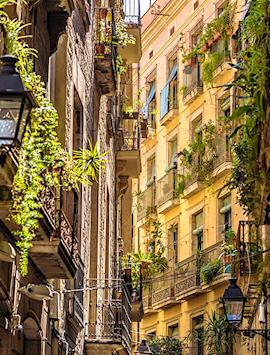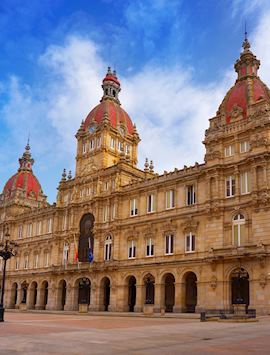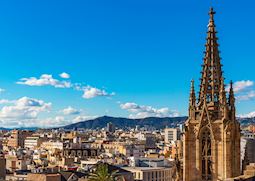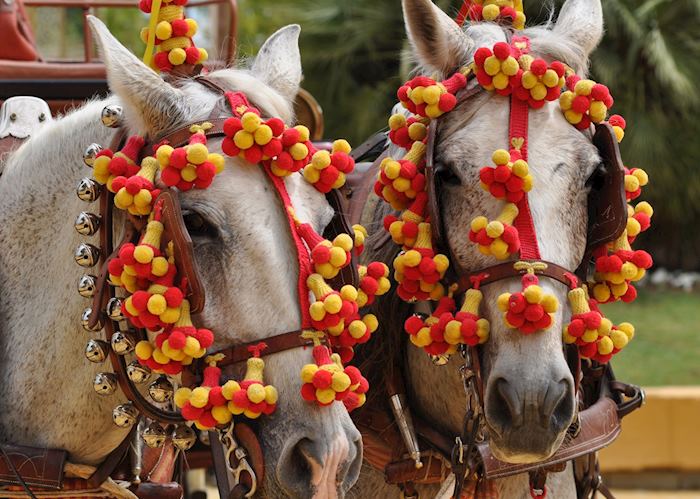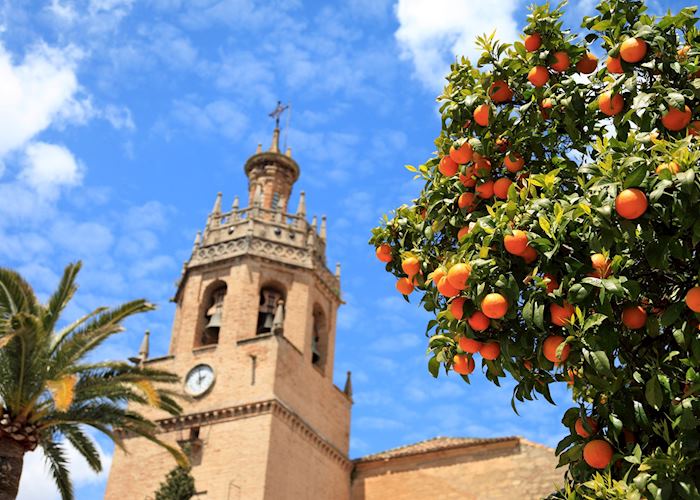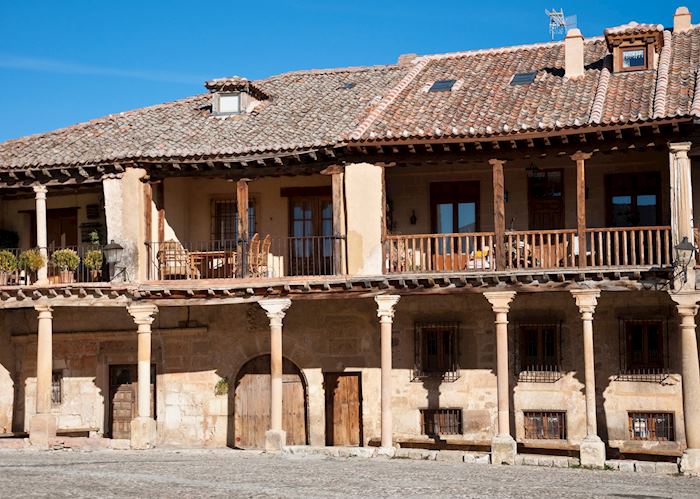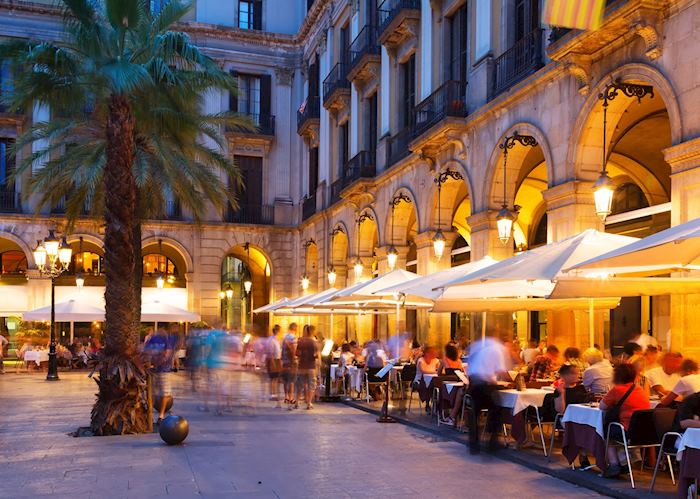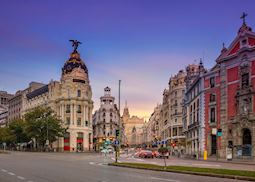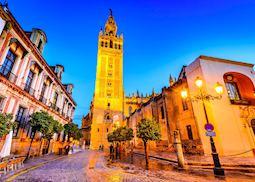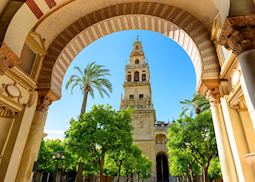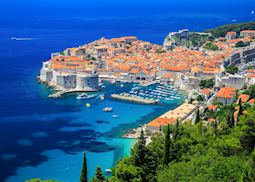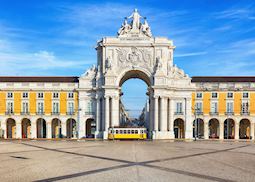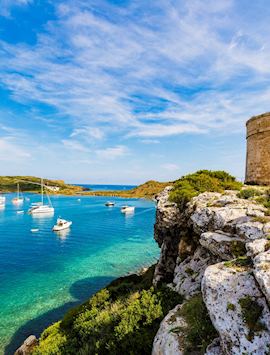

Tailor-made Spain vacations shaped around your passions
A wildly romantic country that dances to a flamenco beat, Spain retains much of its traditional charm at the same time it embraces the new. As you tour Spain, you’ll find great Gothic cathedrals and Moorish palaces, but also sleek modern architecture, cutting-edge cuisines, and sun-drenched hiking trails. Our specialists know Spain well and can provide new perspectives on the country’s highlights, from the cosmopolitan streets of Madrid to the wineries of La Rioja.
We can also plan a Spain vacation that will help you dive deep into the country’s distinct regional cultures. Explore Moorish influences in Andalusia, touring the grandiose confines of the Alhambra. Or, perhaps discover the breadth of cuisine in the Basque Country, where you can enjoy pintxos (tapas on a skewer) and the gourmet offerings of San Sebastián. In the Balearics, you might paddle into hidden coves far from the glitzy beaches. And, in Catalonia, you have the art and architecture of Barcelona, where the legacy of avant-garde minds like Gaudí, Picasso and Miró lives on.
Suggested tours for Spain
These tours give you a starting point for what your vacation to Spain could entail. Treat them as inspiration, as each trip is created uniquely for you.
Suggested activities for Spain
Whatever your interests, our specialists will build activities into your trip that connect to how you want to experience Spain.
-
Ávila and Segovia ![Roman aqueduct, Segovia]()
Ávila and Segovia
MadridÁvila and Segovia
You’ll visit two of the historic cities of Castilla y León — UNESCO World Heritage Sites Ávila and Segovia — on this full-day tour. You’ll stroll their winding streets and see their monumental medieval fortifications, palaces and cathedrals, and Segovia’s Roman aqueduct.
View details -
Basque cooking class ![Pintxos, San Sebastián]()
Basque cooking class
San SebastiánBasque cooking class
As part of this hands-on half-day cooking class in San Sebastián, you’ll learn about the culinary heritage of the Basque Country. You get an introduction to typical ingredients and dishes from the region, and cook a multi-course meal, paired with local wines.
View details -
Toledo visit with wine tasting ![Winery outside of Toledo, Spain]()
Toledo visit with wine tasting
MadridToledo visit with wine tasting
Toledo’s rich history, architectural diversity and cathedral come to life on this full-day privately guided tour to the city from Madrid. You’ll also have time to visit a local vineyard to tour the cellars and sample its wine.
View details
Why travel with Audley?
- 100% tailor-made tours
- Fully protected travel
- Established for over 25 years
- 98% of our clients would recommend us
Best time to visit
Our specialists advise on the best months to visit Spain, including information about climate, events and festivals.
Request our brochure
Covering all seven continents, The World Your Way shows you how you can see the world with us. It features trip ideas from our specialists alongside hand-picked stays and experiences, and introduces our approach to creating meaningful travel experiences.

Useful information for planning your vacation in Spain
The official language of Spain is Castilian Spanish. However, some of Spain’s autonomous communities have their own languages and you may hear Catalan spoken in Barcelona, Basque in San Sebastián, and Galician in Santiago de Compostela. Most people in Spain speak good English.
The currency of Spain is the euro (€). You can buy euro before you arrive or use an ATM on arrival. Credit cards are widely accepted, although paying by American Express may not always be possible.
Tortilla, gazpacho, paella, sangria, Rioja, sherry, and cava are all from Spain meaning a trip here is as much about the food and wine as the sights. It’s common to eat tapas in Spain with a variety of small dishes being shared across the table and possibly across several venues. In the Basque Country, tapas are replaced by pintxos, small snacks skewered on cocktail sticks.
Cured meats such as jamón iberico are popular, fresh fish is used extensively along the coast, and bacalao (salted cod) is a local highlight. You’ll find plenty of distinctive cheeses such as the sharp Manchego, blue cabrales, and nutty, piquant Roncal. For a sweet treat, turrón (almond nougat) and churros (deep-fried dough strips dipped in chocolate sauce) are popular.
You’ll find cava produced in the Penedès region near Barcelona, Rioja in the north, and sherry between a triangle of towns in the south.
A 10% tip is considered standard in Spain but if a service charge is included you don’t need to tip as well. Taxi drivers and porters don’t expect a tip, but it's customary to tip guides and private drivers. Your specialist can give advice on appropriate amounts closer to your trip.
For the latest travel advice for Spain, including entry requirements, health information, and the safety and security situation, please refer to the State Department website.
Moorish palaces, world-class museums, art, architecture, vineyards, and sun-kissed beaches lure visitors to brilliantly diverse Spain. You could get an insight into local culture on a tapas and flamenco evening in Seville, eat your way around San Sebastián on a guided pintxos tour, or learn to cook a traditional paella.
If art and culture are more of interest, you could explore Dalí’s legacy in his home town, cycle through Barcelona to discover Gaudí's flamboyant designs, or take a guided tour of Madrid’s Prado and hear the story behind the finest art in this vast collection.
Alternatively, you could visit pilgrimage sites and historic wineries, relax in the gardens of a sophisticated medieval citadel, or simply laze on the beach.
Spain’s rich architectural heritage lends itself to a wonderfully characterful range of places to stay from restored palaces and convents to avant-garde hotels in the countryside. You could opt for a boutique hotel in downtown Madrid, a medieval palace in the heart of Barcelona’s Gothic Quarter, or sleek designer style and edgy architecture in contemporary wine hotels.
Elsewhere, you can stay in a restored Franciscan monastery inside the Alhambra, or an aristocratic Basque mansion. There are coastal resorts with world-class golf courses, and architectural landmarks turned into five-star hotels.
For more inspiration, take a look at our collection of places to stay in Spain.
Spain’s size and diversity can make it difficult to choose where to go but some of the most popular destinations include Madrid, Barcelona, Granada, and Seville. Madrid is a sophisticated city with world-class museums as well as Belle Époque palaces, in Barcelona you can see Gaudí’s Modernist masterpieces such as the Sagrada Familia and Casa Batlló, while Granada offers the Moorish architecture, tranquil gardens, and royal history of the Alhambra palace.
Seville’s Real Alcazár has a similar style and in its cobbled lanes tiny theaters host impassioned flamenco shows, while Córdoba’s Mezquita, a mosque-cathedral, is the highlight of the UNESCO-protected town. If you have the time, it’s also worth exploring some of Spain’s less-obvious attractions such as the wineries of the Rioja, San Sebastián’s thriving food scene, the medieval churches of Girona, and the tangle of lanes topped by an imposing fortress in hilltop Toledo.
In major Spanish cities, the siesta has been almost phased out, and you won’t notice any change in afternoon working patterns even in the height of summer. Most museums, galleries and churches will remain open so you can still go sight seeing, and larger shops don’t close in mid afternoon.
In smaller towns, however, you might find that stores, banks, and visitor sights close between about 1pm and 4pm but it’s a good time to catch up on a nap, especially if you’ve joined the Spanish custom of eating late at night. Most evenings, particularly in summer, you’ll notice that the streets get busy after work between about 5pm and 8pm, when local people come out of their homes for an evening stroll known as paseo.
It takes around seven and a half hours to fly from the East Coast of the US to Spain, and around 11 hours from the West Coast.
The time zone in Spain is UTC+1 hour. Daylight Savings Time is observed from the last Sunday in March until the last Sunday in October.
The best way to get around in Spain is by car or train. The Spanish road network is well maintained and renting a car gives you the option to travel wherever and whenever you wish. Trains are comfortable, efficient, and reliable and can take the stress away if you’d rather not drive. Alternatively, we can arrange for a private car and driver to take you between destinations.
Use our travel tool to find up-to-date visa and passport requirements for Spain. Enter where you’re traveling to and from (including any stopover destinations en route or flight layovers), along with your intended travel dates and passport details, for a full list of requirements.
Although it’s unlikely you’ll need additional immunizations for Spain, it’s a good idea to speak to your doctor for up-to-date advice. You should also ensure you’re up to date with the routine vaccinations at home. You’ll find a list of suggested vaccinations for Spain on the Centers for Disease Control and Prevention website.
Spain by region
If you’re planning to focus your time in Spain around a particular area, you can jump into the region you're most interested in to find detailed itinerary ideas together with accommodation choices and a taster of the experiences we can offer.
Spain in pictures
Our expert guides to traveling in Spain
Written by our specialists from the viewpoint of their own travels, these guides will help you decide on the shape of your own trip to Spain. Aiming to inspire and inform, we share our recommendations for how to appreciate Spain at its best.
-
In and around Madrid: our highlights guide ![Gran Vía, Madrid]()
In and around Madrid: our highlights guide
In and around Madrid: our highlights guide
Gritty and gracious, Madrid boasts a lively street life, a trio of world-class museums and the largest palace in Western Europe. It’s also a good base for exploring some of Spain’s small medieval cities like Toledo, Ávila and Segovia.
Read this guide -
Introducing Andalusia and Moorish Spain ![Giralda Tower, Seville]()
Introducing Andalusia and Moorish Spain
Introducing Andalusia and Moorish Spain
For seven centuries, Moors ruled southern Spain’s Andalusia region. Spain expert Tom explores their legacy, which includes Islamic palaces, forbidding fortresses and a complex confluence of styles in one of Europe’s few synagogues to survive the Inquisition.
Read this guide -
The taste of Spain: a Spanish food guide ![Paella, Spain]()
The taste of Spain: a Spanish food guide
The taste of Spain: a Spanish food guide
Food is central to Spanish life, both for locals and visitors. From saffron-scented paella and nutty jamón ibérico to convivial tapas and cold, creamy salmorejo, our specialists offer a sampling of the best dishes they’ve eaten in country.
Read this guide -
Cathedrals, monasteries and basilicas of Spain ![La Mezquita, Córdoba]()
Cathedrals, monasteries and basilicas of Spain
Cathedrals, monasteries and basilicas of Spain
Spain specialist and former Madrid resident Allan shares his nominations for the country’s most interesting cathedrals, monasteries and basilicas. His candidates include Montserrat’s mountain monastery, Córdoba’s multicultural Mezquita, and the Gothic glories of the cathedral in Barcelona.
Read this guide

